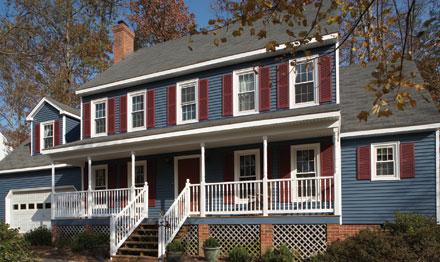 Many of our New Jersey siding customers ask us about the pros and cons of vinyl siding. Installing new vinyl siding is a significant investment, so we thought we’d share our thoughts on the subject.
Many of our New Jersey siding customers ask us about the pros and cons of vinyl siding. Installing new vinyl siding is a significant investment, so we thought we’d share our thoughts on the subject.
Very few things, besides a complete paint job, can enliven the look of a home’s exterior than new siding. Vinyl siding can come in lap and vertical types and though the color palette is limited compared to hardboard and wood, more and more colors are on offer for the homeowner.
Vinyl siding is made mostly out of polyvinyl chloride resin with a few other substances that give it color or make it more malleable and durable. Vinyl siding is almost, but not quite, maintenance free. A spray or power washer should be used on it once or twice a year to keep it clean. Heavy objects should also not be put up against vinyl siding, as they can damage it.
The benefit of vinyl siding is that it’s impervious to splitting, warping, cracking or weather. The color impregnates the material so the siding never needs to be painted. One drawback is because of this it really can’t be repainted. Also, cold weather makes vinyl brittle and very hot sunlight can make it too soft. However, vinyl siding can last longer than the house itself and most vinyl siding comes with a lifetime guarantee. Major brands of vinyl siding include Stucco Masters, Certain Teed Siding, Hebron Brick, Genteck, Owens Corning, Rollex, KP Building and Mastic Siding.
Vinyl siding is lightweight, relatively easy to install, but expensive. It usually costs between three dollars and seven dollars a square foot, not including the coast of labor. The homeowner should be careful to read the warranty that comes with the siding, since installing the siding themselves may void it. Vinyl siding must also be installed with care because temperature changes make it expand and contract noticeably. This is why vinyl siding comes with slots for nails instead of holes and why the installer should put the nail in the center of the slots and not pound them in so securely that they restrict the movement of the siding.
A couple of ways to get value for the dollar is to have insulated vinyl siding installed. Though it’s more expensive to buy, it will save money in the long run.
The homeowner might also want to consider longer panels than they think they need because of vinyl’s tendency to expand and contract. They should also buy a high gauge vinyl siding. This also costs more, but is worth it in the long run.
Interested in learning more? Visit the New Jersey Siding Contractors home page.
Speak Your Mind